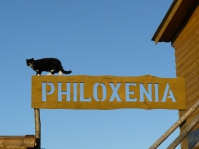
- Новости
-
22 Август 2012http://olkhon.ru/
-
24 Май 2012От всего сердца поздравляем всех путешественников и гостей Филоксении на острове Ольхон с праздником Вознесения Христова! Да пребывает с вами радость о славном Вознесении Христовом! Желаем вам мира душевного, успешного свершения дел, благополучия во всем! Храни и помогай вам Господь!
- Все новости
- Объявления
-
23 Май 2012
-
22 Январь 2012Михаил, псаломщик храма Державной иконы Божьей Матери, отбыл в монастырь для дальнейшего послушания. На вакантное место приглашаются опытные чтецы, с опытом послушания на клиросе в монастрырях и на приходах православных храмов. Проживание и питание при ольхонском храме.
- Все объявления
Фотография "молитвенного дома" (the prayer house) на острове Ольхон в 1909 году
29 Март 2011
подписана на английском языке: "The Only Russian Church in Olkhon". Просьба ко всем знатокам истории этой фотографии и к желающим помочь пролить свет на историю Церкви в центральном Байкале, на острове Ольхон, обращаться к ключнику ольхонского храма иконы Божьей Матери ДЕРЖАВНАЯ Сергею Еремееву.
...."He suggested that I might sleep in the church, or Molitvenny dom (the prayer house)"
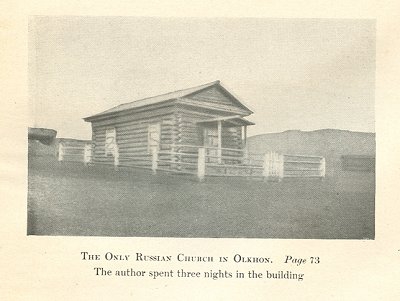
THE ONLY RUSSIAN CHURCH IN OLKHON.
The author spent three nights in the building
A Journey in Southern Siberia, by Jeremiah Curtin, [1909]
....
"The journey from Kutul to Olkhon, though a short one, required considerable exertion and patience. To all appearances there was much difficulty in obtaining horses. There was delay for other reasons also. When I was in the greatest doubt as to what to do the chief of the district arrived at the station, to be present at a Buriat meeting, and he gave me willing assistance; without his aid I should have had a good deal of trouble. He advised me to hire an additional man, one who knew the Olkhon people, and also informed me that the road to the lake was so rough as to necessitate leaving my carriage at Kutul and taking wagons.
The master of post horses at Kutul is a stripling named Muravieff. This man, half Russian, half Buriat, is tremendously bent on making money, and in his dealings is quite as crooked as the world-renowned ram's horn. His father was a full-blooded Buriat. When Count Muravieff Amoorski was

CONVICT PRISON AT A POST STATION.
What looks in this photograph to be a board fence is a square enclosure at least twelve feet high
Page 54
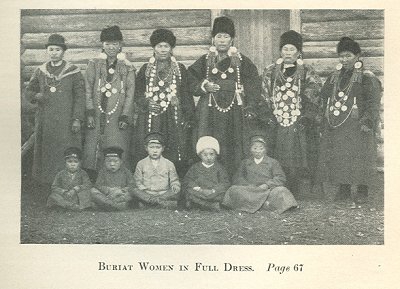
BURIAT WOMEN IN FULL DRESS.
Page 67
governor of Eastern Siberia he took a fancy to this Buriat. Through his influence the young man became a Christian, and at baptism received the name Muravieff; in this way bettering his condition in a worldly sense. Some time after that a Russian girl, deceived by a man, who in due time deserted her, was alone, without a friend or money, and not far from childbirth; the Buriat Muravieff married her; the child, which was a son, he adopted. Later she had a son by Muravieff; this is the half-Buriat stripling whom I have mentioned as being so fond of money.
On the island of Olkhon there is only one store; this store is owned by Muravieff, the Russian, the half brother of the half-blooded Buriat; both are sons of the erstwhile deceived Madame Muravieff.
After annoying delays I obtained four horses and two small springless wagons for the continuation of our journey to the island. My extra man was Protopotoff, "the official inoculator for small-pox." Starting about ten o'clock in the forenoon, we had a most interesting day. Between Kutul and Lake Baikal there are two villages, Kuchulga and Togot; the first contains about fifty houses, the other is much smaller.
The region from Kutul to the lake is in the main rugged and rocky. From the brow of the last elevation to the edge of the water, a distance of two miles, the road we went over is remarkable; it is not the one taken generally; the road for laden wagons is at least a third longer. By this shorter route we crossed a broad stretch of smooth grassland which slopes toward the lake; the descent is not abrupt enough to be dangerous, but is sufficient for swift driving. When well started we went along at a pace like that of tobogganing in Canada. It seemed like coasting on wheels in summer time. The land is so even, its surface yielding the least trifle under the wheels, that the sensation which comes of swift motion was wonderfully pleasant, almost equal to sliding down hill in those days which are now in eternity.
We halted at a house near the water, but still half a mile from the Olkhon Island ferry. At the house, or rather directly in front of it, was a Shaman; around him were five or six bark and
p. 70
iron dishes containing sour milk, sweet milk, and tarasun. He was performing some function of his office. Just before we stopped he made a libation, throwing tarasun up, and chanting a prayer.
The Shaman was a very strange person in visage and action. To a dark, sweating face and bright eyes he added a large round lump or knob on his nose just under and halfway between his eyebrows. He swayed gently from side to side as he chanted and then made a few steps which were short and spasmodic, a kind of twitching. Soon he halted, made another libation, chanted again, sprinkled with tarasun and milk the bushes growing near the house, took a few more spasmodic steps, and finished.
All I could learn was that these offerings had been made to drive sickness away.
The Shaman sprinkled my men with tarasun, muttering a prayer meanwhile, and then he treated them to the liquor with such liberality that it was only after much delay and great urging that I at last got them started again.
The passage to the island, which is rather more than a mile, should be made in good weather, since the lake is very rough at times, and the boats are far from reliable. Our chance for safety was good, as in August the weather is excellent, usually. Two boats, all there are in service, were needed for our company, as we had four horses and two wagons. One of the boats was at the mainland, the other was returning from the island, and we waited for it, wishing to set out together.
The wagons were lifted into the boats. The horses sprang on board very nimbly, showing that they were accustomed to this way of traveling. Each boat carried two horses and one wagon. On my boat there were six rowers, men, women, and children; on the other boat there were four. It took thirty-five minutes to cross.
I felt very curious on approaching the island which the Buriats call "sacred." On one side of the small bay toward which we were sailing a lofty cliff juts out boldly. On the front of that cliff are two immense faces, so distinct that all people note them. One of these looks at the mountains on the
p. 71
mainland; the other on the water in front of it. One as if watching the great world outside to see who might come from it to examine the island and its secrets, the other as if watching the visitors whom the men ferry across.
I drew attention to the faces and learned that they are called "The Watchers." There they gaze, watching night and day, never sleeping; looking, waiting, as waits the great sphynx near the pyramid of Ghizeh.
We landed without any trouble or adventure, and now I was on the sacred island of the Baikal. There are no houses near the landing. The first village is about three miles from the lake. At that place, which bears the name Nur, young Muravieff showed his high qualities and quite a comedy was presented.
I had supposed when we started from Kutul that we should be taken to Sem Sosen (Seven Pines), the chief village of the island, and the only one where there is a store and a possible stopping place. Muravieff, knowing that we were all going there, and that we expected him to take us, made his own plans, but he hid them from us carefully, until we reached Nur. There to our surprise he demanded a change of horses, though we were only a few miles from Seven Pines, our destination. He drove into the village and stopped in front of the house of the elder, the official who is obliged to furnish horses if they are demanded by travelers. The elder's wife, who was quick enough to see what was wanted, declared that her husband was off fishing some twenty versts away and that she did not know when he would return. At that moment he came from an out-house, where he had evidently been sleeping, and thus unwittingly gave a lie to her words, but she was not embarrassed in the least.
As soon as he appeared Muravieff demanded a relay of horses. The elder had no horses to give. All beasts trained to draw wagons were far from the village at pasture.
It was the bounden duty of the elder to find us four horses—they were not to be had, and he could not create them. There were only two or three miles to the end of the journey, and the horses we had were well able to make it, but Muravieff very bluntly refused to drive them farther.
p. 72
At last, through his friends, he informed the elder that he would take us to Sevens Pines for ten rubles. The elder's claim was less than a ruble; government allowed him to receive but three copecks a verst for each horse. He paid the money, however, and Muravieff drove on.
I told Muravieff what I thought of him, but he only smiled with satisfaction. He had gained his point and saw no reason to be ashamed. To him success in any form was a thing to be proud of.
We arrived at Seven Pines about nightfall. The evening was warm and pleasant. The first move, of course, was to find lodgings. There was only one row of buildings in that part of Seven Pines where the store was. The first of these buildings was the storekeeper's dwelling, a house with but one large room; the second building was his store. This proved to be very small, and closely packed with groceries and dry-goods. The third was a shed and could be of no use to me. The fourth belonged to a Russian who was absent. I went to the fifth house, but the woman who lived there told me that there were billions of fleas in her house, and she could not with a clear conscience let any one try to pass a night in it. She felt obliged to refuse me. My search for a place in which to spend the night proving fruitless, I went back to the storekeeper and asked him what I could do. He suggested that I might sleep in the church, or Molitvenny dom (the prayer house). I agreed to this, and my things were transferred to the little prayer house.
Vassya and Lazareff were to sleep under the shed, in their wagon.
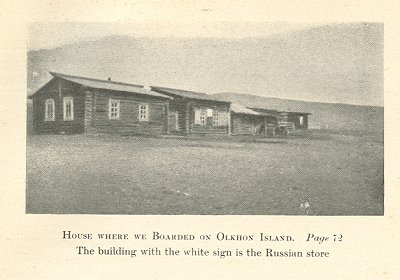
HOUSE WHERE WE BOARDED ON OLKHON ISLAND.
The building with the white sign is the Russian store
Page 73
Next: Chapter VI. Sojourn on the ''Sacred'' Island
THE morning following my arrival on Olkhon the golovar of Kutul, who had accompanied me to the island, returned to the mainland, after sending for a man whom he said could tell me much about the religion and customs of the people, and I was left to the devices of the islanders and others.
The messenger came back alone—the story-teller had gone to the Angara to fish, and would be away for some weeks. We were discussing the position when we saw two men riding in from the direction of the lake, and all called out, "There comes the story-teller." But instead of the story-teller it was Ilbik Urbashkin, the starosta of the second division of the Abazai clan. All the Buriats of Olkhon belong to this clan, but it has two divisions.
I now sent in various directions for men supposed to know stories, but when they came they could give me no information of value.
I had slept two nights on the floor of the little prayer house when the Russian in charge returned from fishing, and immediately deprived me of a shelter. He was an ignorant, self-sufficient peasant whom neither kind words, money, nor documents showing government protection influenced in the least. He was angry that the building had been opened to me during his absence and without his consent. He was in authority, and his authority had been ignored. It was impossible to reason with him. He strove to hide the real cause of his anger by repeating continually, "God's church has been desecrated by being used as a lodging." I was forced to move out.
I had become acquainted with the people of Seven Pines, and a young Buriat, who had recently built a one-roomed house,
p. 74
said that I could occupy it as long as I remained on the island. A stove, a couple of chairs, a pine table, and a bedstead were all the furniture that the room contained. He and his wife were exceedingly kind people. The woman cleaned the room with great care, and the man came several times each day to light the samovar and do what he could to make us comfortable. When not serving us they were busy in a meadow near by, cutting and raking grass. It was pleasant to witness their pleasure and gratitude when at parting I rewarded them for their kindness.
Meanwhile the search for knowledge continued. At last the starosta of Olkhon assembled a crowd near my cottage and questioned each man; but no information was to be obtained. "My father knew much about the old time." "My grandfather was a very wise man, and could have told you a great deal." "I had to work when a child, I had no chance to learn the lore of my people." Such were the answers given.
After a few days of very unsatisfactory work I decided that it was useless to remain longer on the island. Lazareff was uneasy, and anxious to go. He had relatives on the mainland, he said, "who knew all about the Buriats of the old time. They were more intelligent than the islanders, and would give me much valuable information." I was aware that Lazareff had his own interests in view, not mine, but I consented to visit those wise relatives as I wished to meet as many of the Buriats as possible. And on August 13 we left Seven Pines.
When we reached the Baikal a sturdy young girl, wearing pants, boots, a dark shirt and very short skirt, assisted the men in getting the wagons on to the boat, and was afterward one of the rowers. Two men and two small boys managed my boat.
When I turned and looked back at the rock faces, I thought that they had a satisfied expression, as though down in their rock hearts they were glad that we were leaving their sacred island.
It was evening when, greatly wearied, we reached the first post station, which after our experience on Olkhon seemed a very clean and hospitable place. The mistress of the house had returned and we found her an intelligent, kindly woman. At noon the following day we were at the "Ragatz" station, where
p. 75
we were forced to remain the rest of the day and the night. In the morning, after traveling a few versts the carriage gave out, and we stopped at the little village of Kuntin for repairs. The blacksmith, a good-looking old man, with bushy gray hair, was an Italian from Udine near Rome. When he heard his mother tongue once more his eyes lighted with pleasure, and he could not express his delight at meeting some one who knew his language and his country. While he was mending the carriage we took shelter in the house of a certain Petrof, a Russian who owned the vodka shop of the village. The old man boiled eggs and heated the samovar for us, and provided tarasun so liberally that I was afraid that we should have to leave Lazareff in Kuntin. When we returned to the blacksmith shop I snapped a photograph of our outfit, "en memorium," as the old Italian said.
We had a splendid run out of Kuntin; dozens of dogs flew after us, like the wolves after Mazeppa. The horses went at full speed. It was splendid! glorious!
At five o'clock that afternoon, during a heavy rain storm, we reached Kosostép. Seven versts farther on lived Lazareff's relatives. He urged me to continue the journey that evening, but I was weary of bad roads and rain. The station was untidy and miserable. Our supper consisted of bacon and eggs, which for the sake of cleanliness we cooked for ourselves. Lazareff, like most of the Buriats, did not eat "pig meat," so bacon was cut out of his menu. Education had freed Vassya from this prejudice and had roused in him the desire to live as Russians live, hence he shared our supper with pleasure.
The Buriats, even those who are rich, live much like American Indians. There are no regular hours for meals, or any apparent forethought regarding them. Rye bread and mutton are the staples. When guests come, or a family gets hungry, a sheep is killed, skinned, cut up and boiled, and the tough meat is eaten with great relish. Occasionally a cow or a horse is slaughtered for food. If all of the meat is not disposed of immediately, it is dried for future use. Ice, one of the luxuries of modern life, is unknown, except as the covering of lakes and rivers during winter months. If an official or some person whom they wish
p. 76
to show more than usual respect arrives, hidden-away "Russian dainties" are brought forward, and a "lunch before dinner" is served. But this is the reception meal, and will not be repeated.
I was glad to get away from Kosostép early in the morning. The ride, after the rain of the evening before, was delightful.
On each side of the road were meadows where Russians and Buriats, both men and women, were busy mowing and turning grass. The dress of the Buriat woman—pants, boots and a short loose sacque—is convenient for field work, but it is not picturesque. A Russian woman of the laboring class wears a short dark skirt and a bright colored waist, and usually ties a red or red and yellow kerchief around her head. The hay fields that clear cool August morning were animated and dotted here and there with brilliant colors,—a beautiful harvest picture.
With a different climate the rich, black soil of this district would be exceedingly fertile, but as it is wheat will not grow; oats, though they ripen, are not good and the only reasonably sure crop is rye. Grass, however, grows wonderfully well, and at this season of the year nearly all of the men and women were busy in the hay-fields. There is no fruit in any part of Siberia which I have visited. The only berries I have seen were blue-berries, and those were cultivated.
On my arrival at Alaguersk-rod, a beautifully situated little village surrounded by meadows, I found that I was expected. The Uprava, a building used for government purposes, had been made ready, and a samovar was boiling. The "writer," or official translator, and twelve or fifteen Buriats were there to meet me.
The writer, a Russian exiled for life, is an educated and interesting man. Though only forty-five years of age his face is deeply lined and he looks worn and sad, for he has suffered much; fifteen years of his life exile have already past. Later, from an official at Irkutsk, I learned that the man had been in the army, and had been exiled for striking a superior officer.
After drinking tea the work of obtaining information and stories began. The hay-makers, glad of an excuse to leave the field, crowded into the uprava, and soon the place was dark with
p. 77
the smoke and vile with the odor of bad tobacco. An old man commenced well, but was interrupted by a young man, who said that he was not telling the story as he (the young man) had learned it. Then he tried to tell it himself, but could not; the old man was angry and the story was left unfinished.
A man from the Trans-Baikal gave me much important material, but after an hour or so a Buriat from the village, who had been drinking heavily, interfered, and tried to prevent his giving a foreigner information regarding the religion of the country. Only after much uproar and talk and a wearisome answering of questions, asked to establish my position, was the enemy silenced by his neighbors and the officials. In the evening when the crowd had dispersed and the room had been cleared the man in charge of refreshments brought us a dish of beef cut into small bits and boiled—not tempting, but we ate it, for we were hungry. The next day work went on well for a couple of hours, then the story-teller informed me that Irkutsk merchants had sent him to Alaguevsk-rod to hire men to go to the mouth of the Angara to fish. As he had contracted to have the men at the river within a week he could not stay with me longer. I was unable to find another man who could tell me anything of importance.
Lazareff, tired of his relatives if relatives they were, went back to Kosostép at once. I remained for the night, for accommodations, though poor, were better than at the post station. The crowd disappeared, only the exile remained. The man was poor, and his life was one of hardship and anxiety. Later I went with him to his home and met his wife, a frail woman whom trials and poverty have greatly disheartened. I promised to speak a good word for her husband and a few weeks afterward was able to fulfil my promise in such a way as to make his position somewhat easier.
The following morning was so chilly that a fire was needful. There was delay in starting, and it was noon before we reached Kosostép, where I found horses waiting, and we were off at once. At the first station beyond Kosostép we were treated to Siberian fruit—blueberries—which we ate greedily, though they were hard and sour. From this station a sturdy young Russian was
p. 78
our driver. He whirled us over twenty-nine versts rapidly, rushing through Hogotskaya to the post station as fast as the horses could run. Priestoff, the stanovoi of the town, called immediately and invited us to dine with him that evening. This made a pleasant break in the monotony of our return journey.
From Hogotskaya to Baiandai the horses were miserable; one side horse especially was contrary, and would not pull. The driver unharnessed him at last, and hitched him between the thills, where he was forced to work.
Upon our arrival at Baiandai Lazareff and Vassya learned of the death of a relative's child, and, though the child was only a few days old, they made the death an excuse for hastening to Usturdi. Lazareff had been of little help to me, he had caused me much vexation and expense, and I was glad to say: "God speed you."
Baiandai is a curious place. It is a collection of Buriat villages with one Russian settlement. In this settlement nearly every man and woman is either an ex-convict or a person exiled for life. I could have easily gathered many stories there, life tragedies, vastly interesting for a man who wishes to study all phases of life, but I was in Siberia to obtain Mongol material, and did not wander from my task.
Baiandai houses, like most of the houses in Siberia, are unpainted, except the casings and blinds, which are painted white; they get black and old quickly. Many of the buildings have shattered roofs and look uninhabitable, still they are occupied. Though a large place, there was but little to eat; no butter, white bread, or meat of any kind could be obtained. My bed in this village, or collection of villages, was made by putting two doors on two boxes and placing my carriage mattress on those doors.
The Russian secretary of the village was away, but the assist-ant secretary was very kind, and made every effort possible to find "wise men" for me. He was an exile from Little Russia, where he had held a government position. Losing in some way a thousand rubles of government money, he was sent to Siberia for twelve years, leaving at home a son and a daughter, and a position which gave him more than a hundred rubles a month.
p. 79
[paragraph continues]
He had already lived through eleven years of this exile. What he will do when the term ends he does not know. His health is broken; evidently exile has been a frightful experience for him. It is doubtful if work in a mine is worse for an educated and refined man than the monotony and associations of such a place as Baiandai.
After a time a story-teller came. I paid him and sent him away, for he knew only fragments of folk-lore; another came who was not much better, and still others. I remained three days in Baiandai searching diligently for folk-lore, but I could find nothing of value.
The man detailed to care for me during my stay was Danilo of Moscow, a rogue. He was sent to Siberia when nineteen years of age, under sentence to work in the mines, in chains, for fifteen years. Seventeen years ago, when he had served out twelve years of that sentence, he was pardoned. He came to Baiandai, married, and nine children have been born to him. His own account of the crime he committed was that at a festival, when intoxicated, he, with three associates, beat and killed a man whom they had long hated. He has the appearance of being a quiet, inoffensive person, but I found him tricky and wholly unreliable.
Now a great excitement rose in Baiandai: fifteen hundred soldiers were on their way from the Yakuts country to join, at Irkutsk, forces which had been ordered to China. It was reported that they were unruly, destroyed property, and did as they pleased in the villages they passed through. Two hundred were expected in Baiandai; they must be fed, supplied with bread, and the population must furnish carts and horses to carry them to the next station. Officials assembled to keep order. Five hundred rubles were raised to pay for bread, and every competent housekeeper was ordered to bake a certain number of loaves. In this time of unrest I made the acquaintance of Arkokoff, a rich Buriat, who invited me to visit him, and promised to find men familiar with the folk-lore of the country.
August 23, very early in the morning, there was a wonderful commotion and turmoil. The two hundred soldiers had arrived. The uproar was made principally by cart-drivers, those who
p. 80
had brought the men, and those who were to carry them away; by Buriats disputing and quarreling, and by dissatisfied soldiers, who had received mouldy bread when fresh had been paid for. Some exhibited this bread. I heard one soldier declare that it was not fit to feed to hens, another said that pigs would refuse to eat it. The breadmakers defended themselves, and there was a noisy battle of words. But at last the soldiers were off, and when the squeaking of the rickety carts had died away in the distance Baiandai sank back into its usual apathy.
A few hours later I started for the summer home of the Arkokoffs, fifteen versts distant. As the road was smooth and level and the horses were good, we were soon there. Within one immense enclosure are three houses built on the Buriat plan, and one on the Russian, together with sheds and storehouses. The gate of the high board enclosure was open and we halted in front of the Russian house out of which came a very old and very dirty woman and two of the dirtiest men I have ever seen. Arkokoff himself came from one of the Buriat houses. He invited us into the Russian house, and ordered a samovar. While that was preparing he spoke of his wealth and position. He had several thousand head of cattle, four hundred splendid horses, five hundred sheep, and goats as well; a hundred and thirty thousand rubles in the Irkutsk bank, many houses, and a great deal of valuable land. He was a man of influence, for he had money to loan.
When the samovar was brought the steam from it had such a terrible odor that it made us ill at once. Upon asking what caused this peculiar odor Arkokoff said that the water they used was from stored snow, and asked me to go with him and see how well he had it protected.
Back of the houses was a small building, with a door loosely hung and always open. Inside of this building was a hole twenty-five feet deep with steps going down to the bottom. This hole, or reservoir, was filled in cold weather by shoveling in snow, stamping it down and packing it as solid as possible. Men in the reservoir trampled the snow as others threw it in. The well at this time was about one quarter full. The snow had turned to ice,
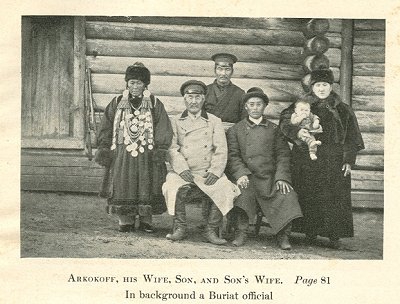
ARKOKOFF, HIS WIFE, SON, AND SON'S WIFE.
In background a Buriat official
Page 61
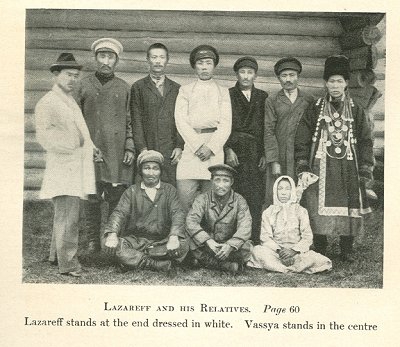
LAZAREFF AND HIS RELATIVES.
Lazareff stands at the end dressed in white. Vassya stands in the centre
Page 60
p. 81
and there was water over the surface. This water was of the color of tea and was full of dirt. A man brought up a bucketful for my inspection. The odor was nearly as bad as from the steam of the samovar.
On looking around outside I saw that the houses and the cattle-yards were on higher ground than the reservoir, and in such a position that the well was to a certain degree a drain.
I decided to leave at once if this was the only water supply. But when I said that I had never used snow water, and thought that undoubtedly it would make me ill, Arkokoff sent men to a small river, quite a distance away, to bring water for my tea.
I now made the acquaintance of Mrs. Arkokoff, a short, fleshy, determined-looking woman about sixty-five years of age. She wore a double-breasted Canton silk coat, blue pants tucked into the tops of long-legged boots, and a pair of new, heavy rubbers—Buriat women think that the gloss of new rubbers gives a dressed-up appearance, and they wear them over their boots in the driest and hottest weather—On her head was a round felt cap, and over her shoulders a bright kerchief, knotted in front. She could speak only Buriat, hence my conversation with her was somewhat limited, but I saw that she ruled every one, with the possible exception of her husband. Later on, in Usturdi, I learned that a few years earlier Arkokoff had married a young woman and taken her to his home. Though among the Buriats it is not unusual to have two wives at the same time, Mrs. Arkokoff No. 1 was very angry, and young Mrs. Arkokoff did not live long.
The old man had a curious collection of people around him. In the kitchen of the house in which I was given a room was a queer-looking woman, a Russian, the widow of an exile. Her sole occupation was making rye bread, and though she complained bitterly of Arkokoff as a miser, who would not pay his help, and when they revolted would say: "Go and sue me; I have money, you have none. See how you will come out," she had labored for him twenty-four years, for three rubles (about a dollar and a half) a month. Near the oven in her untidy kitchen stood a tub of rye flour and a tub of yeast. On a bench, not far from the flour tub, slept, during the day, the night-watch, a man who had served out a sentence for murder. He was tall, lank,
p. 82
and always barefooted; his face unwashed and beard and hair unkempt, a wretched specimen of mankind, mentally unbalanced. He had been a servant in the Arkokoff family for twenty years.
I was invited to visit the Buriat houses in the enclosure, three in number. In the first lived the old man and his wife; in the second their son and his wife; in the third the widow of their elder son, and her four children, one boy and three girls, whose dress—pants, loose shirts, long-legged boots, and caps with visors—made them look precisely like boys. Near the widow's house was a long wagon shed in which were ten or twelve large barrels, each three-fourths full of curd left after distilling tarasun. This curd is given as food to the shepherds, herders, and other laborers. Arkokoff said that it was excellent. The barrels are never covered. When the curd dries and hardens it cracks, as does mud under the heat of the sun. Dust fills the cracks and covers the top. Fresh curd is put in each time that tarasun is made. Curd dried in this way lasts for years. When needed a chunk of the vile stuff is chopped out and cooked with rye flour. Tarasun is distilled almost daily, but fresh curd is seldom eaten. For economy's sake they use the dried. The dust comes from the horse, cattle, and sheep yards near by.
In the Buriat country nearly all the milk from horses and cows is made into tarasun. The Arkokoffs make a great quantity of this liquor, but they also make butter of which the master of the place is very proud. A large panful was brought for my inspection. I noticed that it was covered with specks. I asked to have a section cut out; this was done, and I found that the butter was permeated with fine dust.
A dish of soup, a piece of roast mutton, and some rye bread were brought for our supper, but I did not enjoy it, for the mutton was very tough, and I had seen the breadmaker.
The only possible place for us to sleep in this rich man's house was on the floor of the room which had been given me in the Russian house. The family slept on benches in the Buriat houses. My mattress was brought from the carriage and spread on the floor. The door into the kitchen where the old Russian woman slept, and where the night-watch, the ex-convict, came and went while on duty, could not be locked. Of course I had money with
p. 83
me sufficient to meet traveling expenses and pay men. But I was too weary to borrow trouble, and slept in spite of everything.
Next day story-tellers came and went. Many men crowded into the room to listen, and were a great drawback and annoyance. I got one fine folk-tale, and sent twenty versts for a man who had the reputation of knowing a good deal. He came, but declared that he knew nothing about the old time. Arkokoff insisted that he did, but neither urging nor money availed. I paid him for his lost time and he went home. Another man came; as it was late in the evening he said he would stay and begin work in the morning. In the morning, although I was up at daylight, he had disappeared. At noon an old man arrived, who told one good folk-tale, then his memory failed, and another man took his place. During these hours of waiting and annoyance tea acted as a wonderful sedative. It was fortunate that I had plenty of Russian tea with me, and also rusks, for in Arkokoff's house the only meal during the day is a dish of mutton and a loaf of rye bread, some time between four o'clock in the afternoon and nine in the evening. The family lives mainly on rye bread and tarasun. I had seen the rye bread made and could not eat it, but I derived great pleasure from feeding it to an old, lame, sore-backed dog. My translator was a Russian in the employ of Arkokoff. I paid Arkokoff more each day for the loss of the man's labor than he paid him for a week's work. I also paid the man in the same proportion.
The third day I had no better luck with story-tellers than the second day. My rusks were gone, and at four o'clock I ordered the horses, which a tall Buriat had had in waiting for two days, and in half an hour we were on the road to Olzoni.
Though I was weary and hungry and had paid exorbitantly for my experience, I was well satisfied, for I had spent three days in a typical Mongol family. Arkokoff professes to be greatly devoted to the old religion; perhaps he is. One thing is certain, he is tremendously devoted to making and hoarding money and drinking tarasun.
The Olzoni station was commodious and clean. I should have spent several days there had it been possible to find folk-tales. Trembovski, the Polish merchant, came to welcome me
p. 84
and assist me in getting stories. I had brought Arkokoff's man to aid me, having paid Arkokoff in advance for the time I expected to keep him. But as soon as we reached the village he began drinking and after that I was not sure of him for even half an hour at a time.
In spite of worry and vexation, I remained four days in Olzoni. Then, taking my drunken servant, for fear that I should not get a better one, I started for Upper Kudinsk.
The country we passed through was uncultivated though the soil was rich. I have noticed that there are many wild flowers in Siberia and that they are usually of a purple tint. Daisies of a lavender shade grow everywhere.
At Upper Kudinsk the "People's Quarters" is in an open field half a mile from the village. The house is surrounded by a very high fence. The guest room is small, the bed simply a wooden bench upon which one is expected to put his carriage mattress. The window-sills were packed with tall plants which kept the light out and made the air bad. The official in charge, a Buriat, was very obliging and sent off immediately for "wise men."
Next morning my translator was wonderfully and fearfully drunk. Fortunately I now understood the language so well that I could dispense with his services. A man came who knew folk-tales, and he gave me much valuable information. In the after-noon a middle-aged, blue-spectacled man appeared, and stated that he would tell me "all about the Buriat religion." With him was the son of a Shaman, a bright, intelligent fellow. The middle-aged man, whose name was Kongoroff, was the son-in-law of Arkokoff. He had turned away from the religion of his. forefathers, and was perfectly willing to show me his abandoned gods and tell me about them. I was glad to meet such a man.
That evening there was a good supper, the first enjoyable meal I had had for more than two months: beefsteak and baked potatoes, such potatoes as I had not seen since leaving London, and they were grown in a garden near the house, there in the Buriat country, where I had frequently heard it stated that no vegetable would grow.
But if we had a good supper we had a miserable bed, and a wonderful experience with cockroaches. The moment daylight
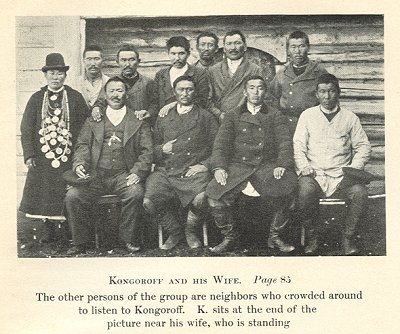
KONGOROFF AND HIS WIFE.
The other persons of the group are neighbors who crowded around to listen to Kongoroff. K. sits at the end of the picture near his wife, who is standing
Page 85
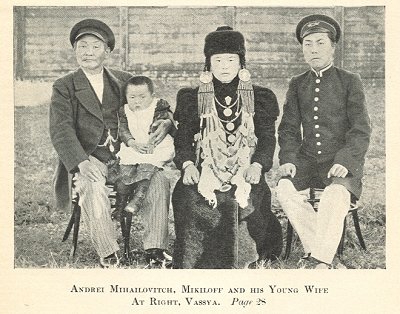
ANDREI MIHAILOVITCH, MIKILOFF AND HIS YOUNG WIFE
AT RIGHT, VASSYA.
Page 28
disappeared they came from their hiding-places and raced everywhere, up the walls, down the walls, on the table, floor, stove, bed, and baskets. Only once before in my life had I seen so many. That was in Guatemala, where in my sleeping-room they ate everything available; ate even the films off photographic plates which I had set up on a shelf to dry. These Buriat cock-roaches were very aggressive, when I tried to sleep I found it beyond the possible. Toward morning I surrendered, dressed, and went out on to the porch. There I found a Jew tailor whose home was in Lodz, Poland. He had been exiled for eleven years, for smuggling, but at that time had only one year longer to serve. He was a peculiar-looking man with curly hair, white, except at the back of the neck, where it was jet black, which gave him a remarkably odd appearance. He had no friendship for the Buriats, whom he said the excessive use of tarasun was destroying as a people. As he spoke German he could converse freely without fear of being overheard, and we had a long talk, mainly about the country and the Buriats.
In the morning, as soon as I could get horses, I started for Kongoroff's. The ride of fifteen versts would have been pleasant but for the horses and the driver. The first were wretched, pitiful; the second was inhuman. The land was rolling and the road heavy, the horses lean and underfed. I was afraid they would give out, but urge or threaten as I might I could not make the heartless driver rest them.
Kongoroff's place was disappointing. The house was so badly kept as to make tea and lunch undesirable. A German from Riga, as he himself declared, came in and began talking rather rapidly. Kongoroff had him turned out soon, and quite rudely, I thought, excusing the act by saying that the man had been drinking. Later he appeared a second time, but was sent off promptly. It seemed much as though Kongoroff, who did not understand German, feared that the man might make some complaint. When I was going the exile came to the carriage, shook hands with me, and said in German, "God sees everything."
Kongoroff brought his Ongons, took them from the boxes, and nailed them to the side of the house to be photographed. They were much like those shown to me by Andrei Mihailovitch.
p. 86
[paragraph continues]
Kongoroff told me their names and attributes. The visit was not very pleasant, and though I obtained a few important facts, I was glad to get away from the place.
Another night-conflict with cockroaches and I was off for Usturdi, accompanied by Zabailenski, the translator, who had made good promises. The trip was delightful. There was just the right temperature and the proper breeze. It was a beautiful day! I had been away one month.
I was anxious to go to Irkutsk, but was determined to get the rest of Manshut's folk-tales before going. I sent for him immediately. My messenger soon returned with word that Manshut was sick. I did not credit this, so I got an order from the chief of the village for the old man to come to the uprava. The man who carried the order was gone an entire day. When at last he came he brought the same message as the first man: Manshut was sick. I did not know what to do. There had been a festival, and nearly all the men in the village were intoxicated. I tried hard to keep Zabailenski from bad company, but toward evening of the first day he disappeared. Andrei Mihailovitch was also drinking heavily. Vassya was about the only man in Usturdi who was not to some degree intoxicated.
CHAPTER VII
A BIRTHDAY IN SIBERIA
ON September 6, my birthday, I hired a troika for four rubles and a half and set out to bring in Manshut, dead or alive. The day was beautiful, the air clear, sweet; the sun shone brightly, and there was a breeze just strong enough to give tone to the atmosphere.
The troika moved not too quickly, but still briskly over the country, which was slightly rolling. The road was excellent, and soon we were abreast of the Hill of Sacrifice, then beyond it. Manshut's village was said to be twenty versts from Usturdi, but it was a short twenty versts. At last we came in sight of several villages, one not far from the other. At the first I inquired for the house of Manshut's employer, and found it by driving through what seemed to me a series of unfenced cattle-yards. In front of the house were half a dozen stolid, stupid women, one of whom was the employer's wife. She gave no information except that her husband was away, and Manshut, who was not at work, was somewhere with friends. Just at that juncture the worst-looking man I have ever seen ran up from somewhere around a corner. His red face was decorated with a nose which was an immense lumpy knob, red as blood. He was terribly repulsive, ragged and dirty beyond description, a man who had drunk barrels and barrels of tarasun.
"I will show you where Manshut's house is," said he. The driver made room for him, and we went, at his direction, toward the end of the village where there were several tumble down houses.
My guide said that Manshut lived with his mother in the second house, but we found that he lived in the first house, not with his mother, but with an old, weird, witch-like creature, who was at
p. 88
the second house sitting on the ground outside with three other very old women. When I asked where Manshut was she did not answer, but got up and going to her own house sat down by the door. Then an unsatisfactory conversation began; one story was that Manshut was visiting somewhere in the neighborhood, another, that he was off cutting grass. I thought that he might be hiding, so I gave the woman some money and she let me go into the house and look around. He was not there.
Meanwhile, the knob-nosed man, with fifty copecks in hand and a promise of more, had gone off to hunt Manshut up. Seeing the man start away the old woman laughed, and said, "Red-nose is a terrible drunkard; you will not see him again."
I decided to go back to the employer's house. On the way I met a Russian-Buriat, who had seen me with Andrei Mihailovitch at the Horse Sacrifice. He was drunk, but gave me more information than I had been able to get hitherto. He said that Manshut's employer had a great deal of grass to cut, and would not let the old man go to Usturdi. He offered to go to the hayfield with me, if I wished. The driver objected to this. He said that the place was across the river, and more than a verst away; his horses were too tired for the trip. I sent for other horses. Then he did not want his wagon to cross the river. At last, very reluctantly, with an increase of pay, he decided to go to the hayfield. The drunken man took his seat by the driver, and we were off.
After driving about half a mile we halted in front of a small house built on the Russian plan. I inquired why we were stopping. "To get a drink," answered my guide. "It is hot; I am terribly dry."
The small house was a dram shop; fortunately it was closed. When he rapped heavily on the door two children came to a broken window, but they refused to let him in; their mother, who was at work in a field quite a distance away, had told them "not to unfasten the door for any one." The man insisted, offered them money, scolded, but they would not disobey. I told him that I was in a hurry and could not wait; that it was almost night. At last, when my patience was nearly gone, he took his seat and we started.
Just at that moment some one who was running across the
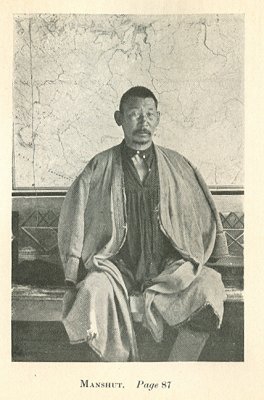
MANSHUT
Page 87
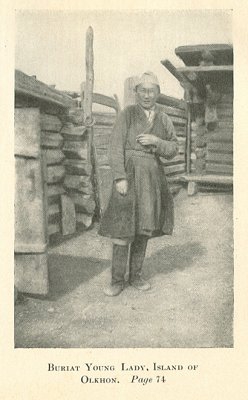
BURIAT YOUNG LADY, ISLAND OF OLKHON.
Page 74
p. 89
field hailed us. It was our knob-nosed friend, who when near enough called out,
"I have found Manshut!"
We turned back at once. The man had somewhere pro-cured a bottle of tarasun. A Shaman came up and a drinking bout began. The bottle was emptied quickly and with great gusto. I was afraid that the driver would get intoxicated; but accustomed to tarasun it had no visible effect.
The knob-nosed man and the Shaman stood up on the back of the wagon and we drove on. Just outside the old witch's house we came upon Manshut. He was ragged and dirty, and had an old handkerchief tied around his head.
Without waiting for words I greeted him, and said: "Get up by the driver. It will be night soon, we must be off immediately!" He took his seat, not hesitating for a moment, and we started.
Usturdi seemed far away that September evening, for the horses were tired, and the air was chilly. It was nine o'clock when we reached the village. It had been a holiday and of course the Buriats had feasted on tarasun; the effects of it were evident everywhere. With great effort we succeeded in getting a samovar and a few pieces of rye bread. It had been a strange birthday; but I was content. I had fought a battle and won a victory.
Manshut told folk-tales for four days, and his work was very satisfactory; nevertheless they were hard days, for my provisions were gone, except tea. No matter how large a Buriat village may be there is never a meat market. Occasionally at the little grocery shops one can buy bacon, kept for Russian customers, but it is of a very poor quality. At this time Usturdi lacked even bacon.
In a Buriat house, as I have stated, there is but one meal in twenty-four hours; tough mutton, rye bread, and tarasun. This meal is eaten without ceremony. Plates and knives and forks are placed on a table which usually has an oilcloth cover, a dish of mutton and a plate of rye bread are brought, and each person serves himself. Tea is used in the morning. The poorer classes drink what is called "block tea," the odor of
p. 90
which is very disagreeable. The well-to-do drink ordinary Russian tea. I am sure that the constant use of tobacco destroys their desire for food, for the rich live as badly as do the poor.
Buriats smoke almost continually, using a pipe with a large bowl and long stem. I have seen children five years of age smoking. Young girls seem more addicted to smoking than boys are, if possible. They are dissipated in every way. It is only after marriage that morality is expected, and then it is strictly enforced.
To the large majority of Buriats Russian is an unknown language. It is difficult to find a man able to carry on an ordinary conversation. Buriat women make no effort whatever to learn Russian. There are no Buriat schools.
I was rejoiced when I had on paper all that Manshut could tell me, for he was so unkempt as to be exceedingly repulsive. I recompensed him well for his time, and his knowledge of ancient tales, and he went away satisfied. Zabailenski was happy also, for I did not count out the days that he had been so intoxicated as to be useless.
We left Usturdi September 13. I was glad to go from the Buriat country, where, though I had gained considerable knowledge, we had endured many hardships.
Seven versts beyond the first station I passed through Iyók, a town of about four thousand ex-convicts, Poles, Jews, Russians, and Tartars, mainly peasants. It is a town with one immensely long street of unpainted houses and fences, all in a more or less tumbled down condition. When we reached Kudà (Where), it was already dusk and we remained for the night, not only because it was difficult to get horses, but because I thought it unsafe to travel in the night time, as within two or three years there had been several murders at this end of the route.
At the Zemski quarters I found the ispravnik 1 of Vernolensk, an uncultured, stupid man. He was on his way to Irkutsk. His wife and aunt had met him at Kudà, and he and they occupied the guest room with trunks and bags which should
p. 91
have been left outside. This was vexatious, but I had an opportunity to study the real character of the man. He would have been officious and guarded had he known that I was traveling under government protection.
The woman in charge of the house gave me a small room where I tried to sleep on a huge box which occupied a good part of the chamber. But at midnight a party of young officers arrived with the governor-general's order for horses. When horses were not to be had there were high words and disputes. They had been ordered to Iyók to make arrangements for quartering a regiment of soldiers there for the winter. As they would not wait for station horses private horses were found, and they continued their journey, much to my satisfaction.
Next morning we were on the road at an early hour, carrying with us the house mistress' blessing, who said, as we parted, "If you never pass this way again I hope to meet you in that other world."
It was a cold and rainy day, and our driver informed us that thereafter there would be "little heat and much cold."
That evening I dined with the governor of Irkutsk, and went with him to the opera. In this quick change from life among the Buriats to the refinements of civilized life in the capital of Siberia, I experienced the striking results of some centuries of social evolution,—an evolution which through its effects upon humanity enables the man of cities to step back in a moment and with no mental effort from the wild, free life of fancy to the prescribed surroundings of material facts.
. . . . . . . .
Thus did I leave the heroes of the past, who fought so bravely with the many-headed Mangathais, and return to the no less valiant men of the present who, struggling with the evil forces of indifference and ignorance, are bringing to Siberia the prosperity that country so well deserves to call her own.
назад к списку объявлений
